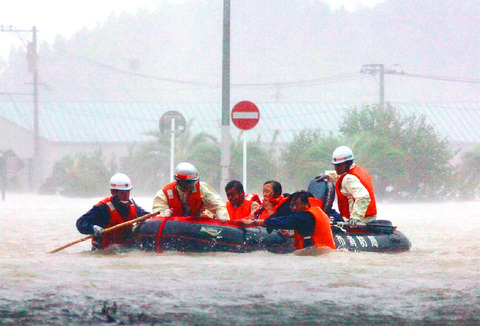A powerful typhoon lashed southern Japan yesterday, killing one person, injuring more than 40 others, and forcing tens of thousands to flee their homes as gale-driven waves hurtled against coastline defenses and storm surges flooded seaside towns. Another 16 people were reported missing.
The government dispatched 70 Self-Defense Force soldiers to storm-hit areas to fortify defenses, cope with flooding and help evacuate the displaced, Chief Cabinet Secretary Hiroyuki Hosoda said.
The typhoon grounded hundreds of flights, blocked trains and ferry services and closed down highways, stranding tens of thou-sands of travelers.

PHOTO: EPA
Typhoon Nabi was packing winds of up to 126kph as it made landfall and traveled up the southernmost main island of Kyushu, Japan's Meteorological Agency said. Heavy rain and wind also pounded the neighboring island of Shikoku.
"The wind and rain was so strong earlier this morning, I could hardly walk -- I couldn't leave the building," said Mitoshi Shiroi from his flooded grocery store in Tarumizu, Kyushu.
"The water just keeps on coming in from under the door. And my products will be ruined without electricity," he said.
Power outages affected over 270,000 households in Kyushu, Kyushu Electric Power Co spokesman Tetsuo Yano said.
The typhoon also forced Prime Minister Junichiro Koizumi to cut short a two-day campaign trip to western Japan ahead of Sunday's national elections.
He was to return to Tokyo last night to avoid the storm, an official from the Liberal Democratic Party said on condition of anonymity, citing party policy.
Police in several prefectures on Kyushu and Shikoku islands confirmed one death and 25 injuries. Another 16 people were missing and over 60,000 were advised to evacuate their homes. Kyodo News Agency reported 41 injuries.
A man in his 70s was found dead after his house was destroyed in a landslide, while nine other people were missing in two other landslides in Miyazaki prefecture, Kyushu island, local police official Takayoshi Tanaka said.
Rescue operations were being hindered by heavy rain and wind, Tanaka said.
An 85-year-old man was also missing in Kagoshima after a mudslide destroyed his home, while a 46-year-old woman and her 10-year-old son were injured when a tree crashed through a window of their home, a local official said.
Japan Airlines and its affiliates canceled 307 flights yesterday, including 10 on international routes, while All Nippon Airlines grounded 374 domestic flights. More than 60,000 people were affected by the cancellations, according to the two companies.
Nabi was expected to move northeast and become the first typhoon to hit South Korea this year.

TIT-FOR-TAT: The arrest of Filipinos that Manila said were in China as part of a scholarship program follows the Philippines’ detention of at least a dozen Chinese The Philippines yesterday expressed alarm over the arrest of three Filipinos in China on suspicion of espionage, saying they were ordinary citizens and the arrests could be retaliation for Manila’s crackdown against alleged Chinese spies. Chinese authorities arrested the Filipinos and accused them of working for the Philippine National Security Council to gather classified information on its military, the state-run China Daily reported earlier this week, citing state security officials. It said the three had confessed to the crime. The National Security Council disputed Beijing’s accusations, saying the three were former recipients of a government scholarship program created under an agreement between the

Sitting around a wrestling ring, churchgoers roared as local hero Billy O’Keeffe body-slammed a fighter named Disciple. Beneath stained-glass windows, they whooped and cheered as burly, tattooed wresters tumbled into the aisle during a six-man tag-team battle. This is Wrestling Church, which brings blood, sweat and tears — mostly sweat — to St Peter’s Anglican church in the northern England town of Shipley. It is the creation of Gareth Thompson, a charismatic 37-year-old who said he was saved by pro wrestling and Jesus — and wants others to have the same experience. The outsized characters and scripted morality battles of pro wrestling fit

ACCESS DISPUTE: The blast struck a house, and set cars and tractors alight, with the fires wrecking several other structures and cutting electricity An explosion killed at least five people, including a pregnant woman and a one-year-old, during a standoff between rival groups of gold miners early on Thursday in northwestern Bolivia, police said, a rare instance of a territorial dispute between the nation’s mining cooperatives turning fatal. The blast thundered through the Yani mining camp as two rival mining groups disputed access to the gold mine near the mountain town of Sorata, about 150km northwest of the country’s administrative capital of La Paz, said Colonel Gunther Agudo, a local police officer. Several gold deposits straddle the remote area. Agudo had initially reported six people killed,

SUSPICION: Junta leader Min Aung Hlaing returned to protests after attending a summit at which he promised to hold ‘free and fair’ elections, which critics derided as a sham The death toll from a major earthquake in Myanmar has risen to more than 3,300, state media said yesterday, as the UN aid chief made a renewed call for the world to help the disaster-struck nation. The quake on Friday last week flattened buildings and destroyed infrastructure across the country, resulting in 3,354 deaths and 4,508 people injured, with 220 others missing, new figures published by state media showed. More than one week after the disaster, many people in the country are still without shelter, either forced to sleep outdoors because their homes were destroyed or wary of further collapses. A UN estimate